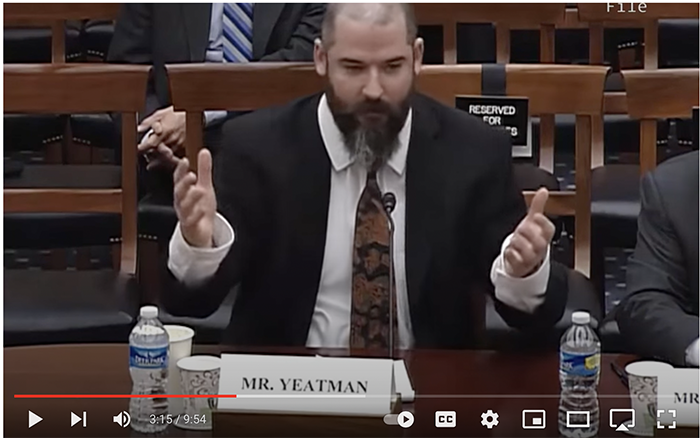|
|
Section 1. K.S.A. 25-125 is hereby amended to read as follows: 25-125.
(a) The governor shall not have any authority to modify election laws or procedures by issuance of an executive order.
(b) Except as provided in subsection (c), neither the executive branch nor the judicial branch of state government shall have any authority to modify the state election laws.
(c) Neither the governor, the secretary of state nor any other officer in the executive branch shall not enter into any consent decree or other agreement with any state or federal court or any agreement with any other party regarding the enforcement of any election law or the alteration of any election procedure without specific approval of such consent decree or other agreement by the legislature or the legislative coordinating council if the legislature is not in session at the time such agreement is submitted for approval.
(d) Nothing in this section shall be construed to limit or otherwise restrict the judicial branch of state government in the exercise of any powers granted by article 3 of the constitution of the state of Kansas.
(e) If any provision of this section or the application thereof to any person or circumstance is held invalid, such invalidity shall not affect the other provisions or applications of the section that can be given effect without the invalid provision or application, and, to this end, the provisions of this section are severable.
Sec. 3. This act shall take effect and be in force from and after its publication in the statute book.
Wisconsin AB 1070/ Senate Bill 884
This bill requires a party that alleges that a statute is unconstitutional, or in violation of or preempted by federal law, to serve the speaker of the assembly, the president of the senate, and the senate majority leader with a copy of the proceeding. The bill also requires that, in such cases, the assembly, the senate, and the Joint Committee on Legislative Organization (JCLO) are entitled to be heard, representing the legislature and the state
Under current law, if a statute, ordinance, or franchise is alleged to be unconstitutional, the attorney general must be served with a copy of the proceeding and be entitled to be heard. This requirement exists in the statutes for declaratory judgment acts under s. 806.04 (11). The Wisconsin Supreme Court has also extended the requirement to other types of actions involving claims that a statute is unconstitutional. See Kurtz v. City of Waukesha, 91 Wis. 2d 103, 280 N.W.2d 757 (1979). This bill incorporates the Kurtz rule into the statutes and extends both the current statutory and Kurtz requirements of service and an opportunity to be heard to the legislature when a statute is alleged to be unconstitutional or in violation of or preempted by federal law.
The bill also provides that when a party challenges the constitutionality of a statute, facially or as applied, or challenges a statute as violating or preempted by federal law, as part of a claim or affirmative defense, the assembly, the senate, and JCLO have the right at any time to intervene and participate in the action and may also retain legal counsel other than the Department of Justice. Under the bill, the Committee on Assembly Organization may intervene in the action, as well as obtain legal counsel, on behalf of the assembly; the Committee on Senate Organization may intervene in the action, as well as obtain legal counsel, on behalf of the senate; and JCLO may intervene in the action, as well as obtain legal counsel, on behalf of the state. If JCLO determines that the interests of the state will be best represented by special counsel appointed by the legislature, JCLO must appoint special counsel to represent the state defendants and act instead of the attorney general. In these circumstances, special counsel has the powers of the attorney general with respect to the litigation to which special counsel has been appointed.
Eliminates the ability of the governor and other state officers or agencies to nominate individuals for positions who have already been rejected by the Senate.
Under current law, DOJ deposits settlement funds that are not committed under the terms of the settlement into a DOJ appropriation and may spend the funds only after submitting a plan for the expenditure to the Joint Committee on Finance for passive review. If JCF does not schedule a meeting to review the proposed plan within 14 days, DOJ may expend the funds as provided in the plan. This bill requires that DOJ must deposit all settlement funds into the general fund. This bill also lapses all unencumbered settlement funds that are currently in the DOJ appropriation into the general fund.
Current law allows the attorney general to compromise or discontinue an action DOJ is prosecuting if the governor approves the compromise or discontinuance. This bill requires JCF to approve the compromise or discontinuance instead of the governor. Current law allows the attorney general to settle and compromise actions in which the attorney general is appearing for and defending the state as the attorney general determines to be in the best interest of the state. This bill requires that, if the action is for injunctive relief or there is a proposed consent decree, the attorney general must submit the settlement or compromise plan to JCF for passive review. If JCF does not schedule a meeting to review the plan within 14 days, the attorney general may proceed, but, if JCF does schedule a meeting, the attorney general may proceed only with the approval of JCF.
The bill further provides that the attorney general may not submit a proposed settlement plan to JCF in which the plan concedes the unconstitutionality or other invalidity of a statute without the approval of JCLO.
Background Documentation

__________
